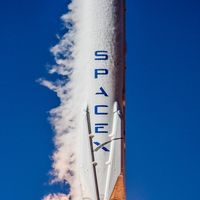Navigating the New Era of Transportation and Space Exploration
January 30, 2025, 10:24 pm

Location: United States, District of Columbia, Washington
Employees: 5001-10000
Founded date: 2002
Total raised: $7.53B
The world of transportation and space exploration is changing rapidly. New leaders are stepping into pivotal roles, and the stakes are higher than ever. The recent confirmation of Sean Duffy as the head of the Transportation Department is a clear signal of this shift. His role will shape the future of American transportation, especially in the electric vehicle sector, where competition is fierce.
Duffy’s confirmation comes at a time when the electric vehicle market is booming. Tesla, led by Elon Musk, has been a frontrunner in this race. The stock market reflects this enthusiasm. Investors are betting on a future where unified federal regulations will pave the way for innovation. Duffy has promised to uphold the integrity of investigations by the National Highway Traffic Safety Administration (NHTSA). This is crucial, especially with ongoing probes into Tesla’s self-driving technology, which has faced scrutiny after several high-profile incidents.
The competition is not just domestic. China looms large as a formidable adversary. Duffy emphasized the need for clear regulations to keep pace with countries that foster innovation. The Chinese electric vehicle manufacturer BYD is gaining ground, threatening Tesla’s dominance in both China and Europe. The race is on, and the stakes are high. Without a cohesive strategy, the U.S. risks falling behind.
Musk’s influence extends beyond Tesla. His rocket company, SpaceX, is also under the DOT’s purview. With billions in federal contracts, any regulatory changes could impact Musk’s ventures significantly. The Federal Aviation Administration (FAA) has previously fined SpaceX for safety violations. Duffy’s decisions will be scrutinized closely, as they could either bolster or hinder Musk’s ambitions in space.
Meanwhile, the global landscape of space exploration is shifting. The U.S. remains a leader, but the gap is narrowing. Recent statistics reveal a stark contrast in launch capabilities. In 2024, the U.S. conducted 158 launches, while China followed with 68. Russia, however, lagged behind with only 17 launches. This disparity highlights the challenges facing the Russian space industry, which is struggling to keep pace with its competitors.
Elon Musk’s SpaceX is not just launching more rockets; it’s launching heavier payloads. In terms of mass delivered to orbit, the U.S. outperformed China and Russia significantly. This isn’t just a numbers game; it’s about the capability to deliver complex missions. The U.S. is not just leading in quantity but also in quality.
Yet, the competition is not solely between the giants. Countries like Japan and members of the European Union are also in the mix. Japan managed only seven launches in 2024, while Europe managed three. This paints a picture of a global race where every launch counts. Each nation is vying for a piece of the space pie, and the dynamics are constantly shifting.
The narrative of space exploration is not just about who launches
Duffy’s confirmation comes at a time when the electric vehicle market is booming. Tesla, led by Elon Musk, has been a frontrunner in this race. The stock market reflects this enthusiasm. Investors are betting on a future where unified federal regulations will pave the way for innovation. Duffy has promised to uphold the integrity of investigations by the National Highway Traffic Safety Administration (NHTSA). This is crucial, especially with ongoing probes into Tesla’s self-driving technology, which has faced scrutiny after several high-profile incidents.
The competition is not just domestic. China looms large as a formidable adversary. Duffy emphasized the need for clear regulations to keep pace with countries that foster innovation. The Chinese electric vehicle manufacturer BYD is gaining ground, threatening Tesla’s dominance in both China and Europe. The race is on, and the stakes are high. Without a cohesive strategy, the U.S. risks falling behind.
Musk’s influence extends beyond Tesla. His rocket company, SpaceX, is also under the DOT’s purview. With billions in federal contracts, any regulatory changes could impact Musk’s ventures significantly. The Federal Aviation Administration (FAA) has previously fined SpaceX for safety violations. Duffy’s decisions will be scrutinized closely, as they could either bolster or hinder Musk’s ambitions in space.
Meanwhile, the global landscape of space exploration is shifting. The U.S. remains a leader, but the gap is narrowing. Recent statistics reveal a stark contrast in launch capabilities. In 2024, the U.S. conducted 158 launches, while China followed with 68. Russia, however, lagged behind with only 17 launches. This disparity highlights the challenges facing the Russian space industry, which is struggling to keep pace with its competitors.
Elon Musk’s SpaceX is not just launching more rockets; it’s launching heavier payloads. In terms of mass delivered to orbit, the U.S. outperformed China and Russia significantly. This isn’t just a numbers game; it’s about the capability to deliver complex missions. The U.S. is not just leading in quantity but also in quality.
Yet, the competition is not solely between the giants. Countries like Japan and members of the European Union are also in the mix. Japan managed only seven launches in 2024, while Europe managed three. This paints a picture of a global race where every launch counts. Each nation is vying for a piece of the space pie, and the dynamics are constantly shifting.
The narrative of space exploration is not just about who launches